A Guide To The Best Vitamins For Hair Growth
Hair is the fastest growing tissue in the human body and regardless of age, our scalp and hair need a lot of loving attention. When it comes to hair growth, most people think that you only need to take a vitamin supplement if you are experiencing hair loss. While this is partially true, it is important to remember that our body needs a variety of vitamins and minerals in order to grow healthy hair. In this blog post, we will discuss the best dermatologist-recommended vitamins for hair growth and why they are important. We will also look at one of the top hair growth pills on the market and see what ingredients it contains to reduce hair loss. So, if you are looking for ways to improve your hair health, keep reading!
What happens to our hair when our body does not have enough vitamins and minerals?
Vitamin and mineral deficiency can lead to poor health, severe hair loss, dry hair, and hair breakage. As we mentioned, our hair requires a variety of vitamins and minerals in order to support hair growth. When the body does not have enough of these nutrients, it can lead to increased shedding or thinning hair. Additionally, vitamin deficiencies can also cause the hair to become dry and brittle. This is why it is so important to make sure that you are getting all of the nutrients that you need with the best vitamins and supplements that support health.
What are the 102 Minerals that the Body Needs?
The human body needs 102 different minerals for good health and hair production. However, sometimes our bodies don't have enough of a certain mineral or vitamin. When this happens, it can cause some serious hair health problems.
Are you curious to know all 102 minerals that the body needs? Here's the list:
-
actinium
-
aluminum
-
americium
-
antimony
-
argon
-
arsenic
-
astatine
-
barium
-
berkelium
-
beryllium
-
bismuth
-
bohrium
-
boron
-
bromine
-
cadmium
-
caesium
-
calcium
-
californium
-
carbon
-
cerium
-
chlorine
-
chromium
-
cobalt
-
copper
-
curium
-
dubnium
-
dysprosium
-
einsteinium
-
erbium
-
europium
-
fermium
-
florine
-
francium
-
gadolinium
-
gallium
-
germanium
-
gold
-
hafnium
-
hassium
-
helium
-
holmium
-
hydrogen
-
indium
-
iodine
-
iridium
-
iron
-
krypton
-
lanthanum
-
lead
-
lithium
-
lutetium
-
magnesium
-
manganese
-
mercury
-
molybdenum
-
neodymium
-
neon
-
neptunium
-
nickel
-
niobium
-
nitrogen
-
osmium
-
palladium
-
phosphorous
-
platinum
-
plutonium
-
polonium
-
potassium
-
praseodymium
-
promethium
-
protactinium
-
radium
-
radon
-
rhenium
-
rhodium
-
rubidium
-
ruthenium
-
samarium
-
scandium
-
selenium
-
silicon
-
silver
-
sodium
-
strontium
-
Sulphur
-
tantalum
-
technetium
-
tellurium
-
terbium
-
thallium
-
thorium
-
thulium
-
tin
-
titanium
-
tungsten
-
uranium
-
vanadium
-
xenon
-
ytterbium
-
yttrium
-
zirconium, and
-
zinc.
What are the most important vitamins that our hair follicles need?

Hair Healthy Vitamins and Supplements
Many factors influence hair growth and health. Nutrition, genetics, medical conditions, hormones, and stress can all play a role. Research has found that a deficiency in certain vitamins and minerals may contribute to hair loss. Some important ones to prevent poor health and further hair loss include fish oil, B vitamins, vitamin D, vitamin E, zinc, biotin, and iron.
B Vitamins
Since B vitamins are present in an array of common foods, most women reach their daily allowances by following a balanced diet. These nutrients play an important role in hair growth and can be found in whole grains, meat, fish, eggs, nuts, and avocados. Along with these functions, B vitamins are essential for metabolism and nervous system function.
Biotin
Biotin, also known as vitamin B7, is a complex B vitamin that is often said to help reduce hair loss. There is some truth to this. One of biotin's functions is to create red blood cells. Red blood cells carry oxygen and nutrients to the dermal papillae which is right beneath the follicle. Biotin also helps produce keratin, which is a main component of hair.
The National Institute of Health says that most women get enough biotin from the foods they eat. If you want to get more biotin, eat foods like milk, eggs, bananas, salmon, sweet potatoes and almonds. If you feel like you need more biotin than you're getting from food, talk to your doctor about incorporating a biotin supplement. Biotin supplements will support healthy levels of new hair growth. Your doctor might be able to recommend a biotin supplement that has more than the recommended daily amount if needed to reduce shedding.
Vitamin C
Citrus fruits anyone? Not only is vitamin C important for your immune system, it can also help make your hair stronger. Vitamin C is a powerful antioxidant, and it's essential for healthy growth. Vitamin C helps increase blood circulation throughout your body. When there is increased blood circulation to your scalp, there is greater stimulation of your follicles, which may help promote hair growth. You can get Vitamin C in many ways - from the natural orange flavor of a vitamin-c supplement, or with natural ingredients like bell peppers, oranges, and grapefruit.
Iron
Iron is surprisingly important for hair growth, and studies published in the Journal of Korean Medical Sciences suggest that iron deficiency may be linked to female hair loss and male pattern baldness. This mineral promotes circulation and improves the ability of the blood to carry oxygen to the cells in your scalp, which can help regrow hair. If you don't get enough iron, your body won't be able to generate enough hemoglobin; this will cause problems with oxygen delivery to your scalp and contribute towards baldness.
Iron can be naturally sourced from red meat meat (heme-iron) or plants (non-heme iron). Some iron-rich foods include clams, red meat, spinach, and lentils. If you're concerned about your iron intake, you might want to consider taking an iron supplement to prevent hair loss. However, always speak with your doctor before starting any new supplement hair care routine.
Keratin
Keratin is a protein found in hair, skin, and nails. It’s naturally produced by the body, but many women take supplements to help with hair health. However, you can get more keratin into your system in the form of protein-rich foods like eggs, beans, and fish as opposed to taking vitamins and supplements. If you take too much keratin, your body will not be able to process it all. This can lead to an accumulation of protein, which is harmful. Using a keratin-rich scalp and hair treatment can help to give you the appearance of thicker, fuller hair. This type of treatment can also help to make your hair look healthier and shinier. Too much keratin topically applied can cause scalp irritation which would lead to problems.
Vitamin D
A deficiency of vitamin D can lead to hair loss. Vitamin D is used by skin cells to make keratin. When the body does not have enough vitamin D, the skin cells in hair follicles have a hard time making hair grow, which can lead to hair shedding and hair loss.
Vitamin A
Vitamin A improves skin and hair by helping skin glands produce sebum. Some women think that taking vitamin A can help with regrowth. But it's important to remember that too much of this vitamin can actually cause hair loss. Vitamin A is a group of compounds that includes retinol, retinal, retinoic acid and provitamin A carotenoids. Some scientists did a study involving mice and found that when these animals ate foods high in vitamin A, it made their follicles work better. But this isn't always the case... on the other hand, there is evidence that too much vitamin A can lead to hair loss.
Some women lose their hair because they don't have enough vitamin A. But this is not common in the U.S. You can get more vitamin A by eating a diet rich in leafy greens, carrots, pumpkin, sweet potatoes, and yellow squashes.
Zinc
Zinc is of vital importance to the health of the human body. So much in fact, that a low serum zinc level can correlate with dangerous disease. Zinc also plays an important role in hair tissue growth and repair. It also helps keep the oil glands around the follicles working properly. Zinc can be found in the following food diet: Oysters, Beef, Lamb, Pumpkin seeds, and Dark chocolate. Your dermatologist may also suggest a zinc supplement. Studies show resolving zinc deficiency with supplementation may reduce deficiency-related hair loss.
Magnesium Stearate
Not only does magnesium help hair regrowth, but it also fortifies existing strands for a full, healthy head of hair. Women with a medical history of alopecia areata can benefit from incorporating magnesium into their diet in the form of food or nutritional supplementation. Nuts and seeds are a great source of magnesium. Other magnesium-rich foods include dark leafy greens, beans, whole grains, and avocados.
Other Nutrients for Hair Growth
The above vitamins and minerals aren’t the only way to improve your hair health. Some oils, like rosemary and coconut oil (which can be found in the CRISAN Hair Strengthening Oil), may also help with hair growth. A study found that consistent use of rosemary oil over several months led to an increase in hair count.
Meanwhile, another study that compared coconut oil to mineral oil and sunflower oil found that coconut oil was the only one that reduced the protein loss for both undamaged and damaged hair when it was used as a pre-wash and post-wash treatment.
Pills for Hair Growth
There are many vitamins and minerals that can help you have healthier hair. You can also take supplements to help with hair growth. But it is important to speak with your doctor before taking any supplements, especially if you are already taking other medications, to make sure that there will be no interactions.
Are hair growth pills all equal?
No, not all nutritional deficiencies or female pattern hair loss can be addressed with a single pill. In order to get the best results, it is important to find a pill that contains the right mix of ingredients. There are many different pills on the market, so it can be difficult to know which one is the best.
What vitamins and minerals are in most hair growth supplements?
Most hair growth pills contain a mix of vitamins and minerals. The most important vitamins for hair growth are vitamin A, vitamin C, and vitamin E. These vitamins help to promote growth. In addition, many pills also contain biotin, which is a water-soluble vitamin that helps to strengthen hair and nails.
What ingredients are in the Complete Hair Essentials Vegan Daily Vitamins from CRISAN Beauty
Organic Ceylon Gotu Kola
Ceylon Gotu Kola is great for treating a dry scalp and preventing hair fall. The antioxidant components not only help in rejuvenating your cells but also promote regeneration of healthy hair.
Shop Now
Organic Ashwagandha
Stress no-more with Organic Ashwagandha
Ashwagandha is an adaptogen that is believed to help improve blood circulation to the scalp and strengthen the hair, as well as help get rid of dandruff. It is a critical ingredient for any alopecia treatment. It also appears to stimulate production of melanin, the pigment responsible for the color of your hair. Ashwagandha is scientifically proven to help your body manage stress and it can also boost brain function, lower blood sugar and cortisol levels, and help fight symptoms of anxiety and depression.
Organic South Indian Curry Leaf
Curry leaves are loaded with Vitamin A, B, C and B12. Apart from that, these leaves are also a great source of natural iron and calcium.The protein and beta-carotene present in curry leaves help in increasing hair growth and reducing hair fall. The antioxidants and amino acids are also beneficial in moisturizing the scalp and strengthening the hair follicles.
Organic Fenugreek
Fenugreek's hair-growing benefits are attributed to its ability to increase blood flow to the skin’s surface. Research published in the Journal of Medicinal Plant Research also suggests fenugreek can help to prevent hair fall due to its high protein content.
Organic Moringa Leaf
Moringa is abundant in antioxidants, vitamins, and essential amino acids. It helps to reduce inflammation due to its antioxidant properties, which include vitamin C, vitamin E, selenium, flavonoids, and phenolics. Moringa is packed with amino acids, the building blocks of cells. There are a handful that are particularly important in hair growth - arginine, cystine, cysteine, lysine, methionine- all of which are abundant in Moringa. Moringa is also one of the top vegetarian sources of iron & zinc. Iron deficiency and low levels of zinc have been linked with hair loss for years now, making moringa a logical ingredient for healthy hair growth.
Organic Curcumin (as Turmeric Root Extract)
The way in which curcumin has a positive effect in reducing hair loss and encouraging growth is due to its antioxidant and anti-inflammatory properties, which help the body to heal and recover more easily from conditions that may negatively affect hair follicles and the scalp Curcumin has also been shown to have inhibitory effects on androgens (and, more specifically, DHT).
Organic Ceylon Black Pepper
The power of curcumin is only strong if it is absorbed into the bloodstream. Combining the piperine in black pepper with the curcumin in turmeric enhances curcumin absorption by up to 2,000%
What to do if you have Female Pattern Hair Loss

A lot of women suffer from hair loss, but don't know what to do about it. This can be a really frustrating and embarrassing problem to deal with regardless of your age. I hope these tips help you know how to cope with hair loss:
1. Don't be afraid to ask for help. There are a lot of great products and treatments out there for hair loss, so don't be afraid to ask your doctor, dermatologist, trichologist, or hairstylist for advice. Your doctor may conduct a scalp biopsy
2. Be patient. It may take some time before you see results from any treatments you try. Just keep up the good work and you'll start seeing improvements soon enough!
3. Embrace your natural look. A lot of women feel self-conscious about their hair loss, but you don't have to! Embrace your natural look and feel confident in who you are!
If you have any questions, feel free to call our customer support line at (469)206-9632 or e-mail us at info@crisanbeauty.com






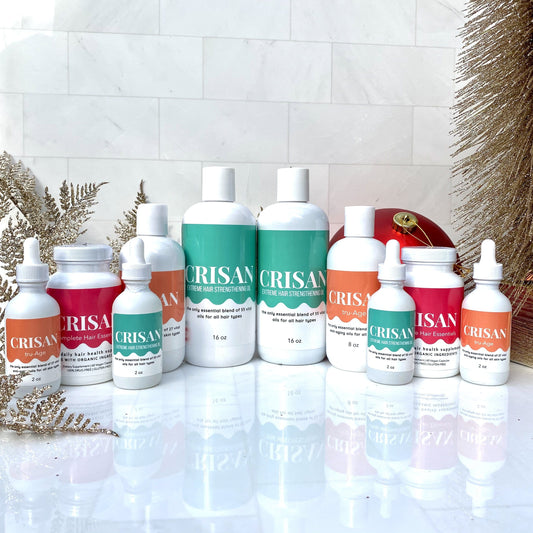
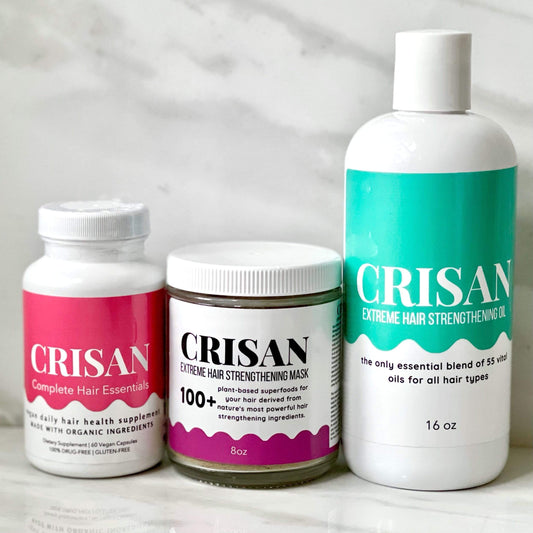
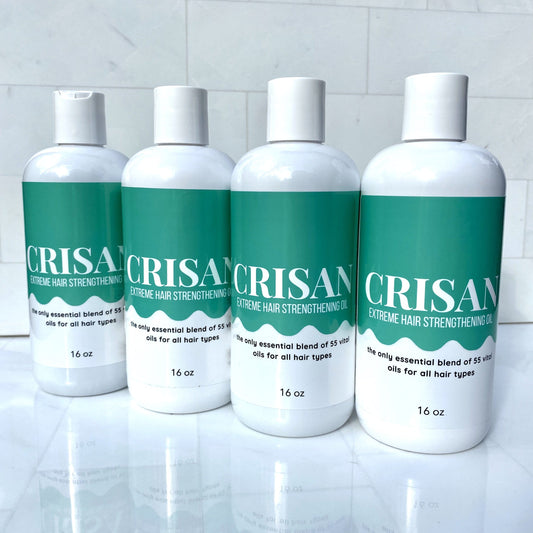
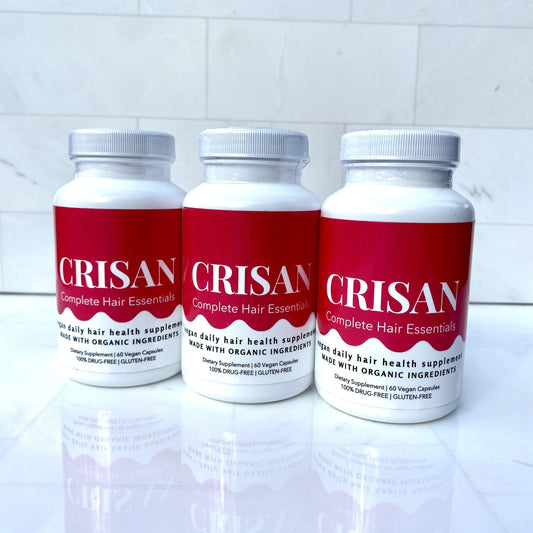
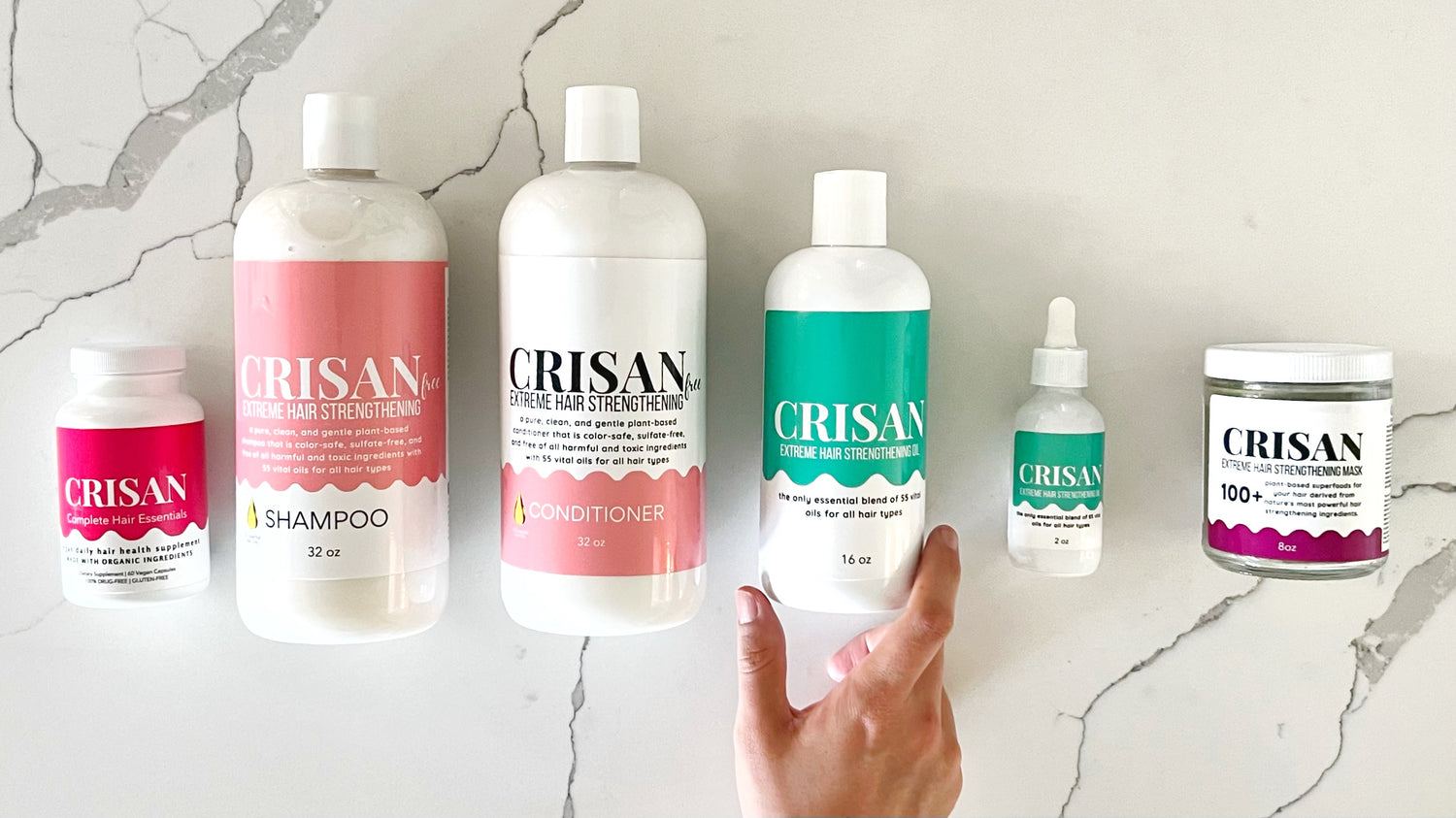
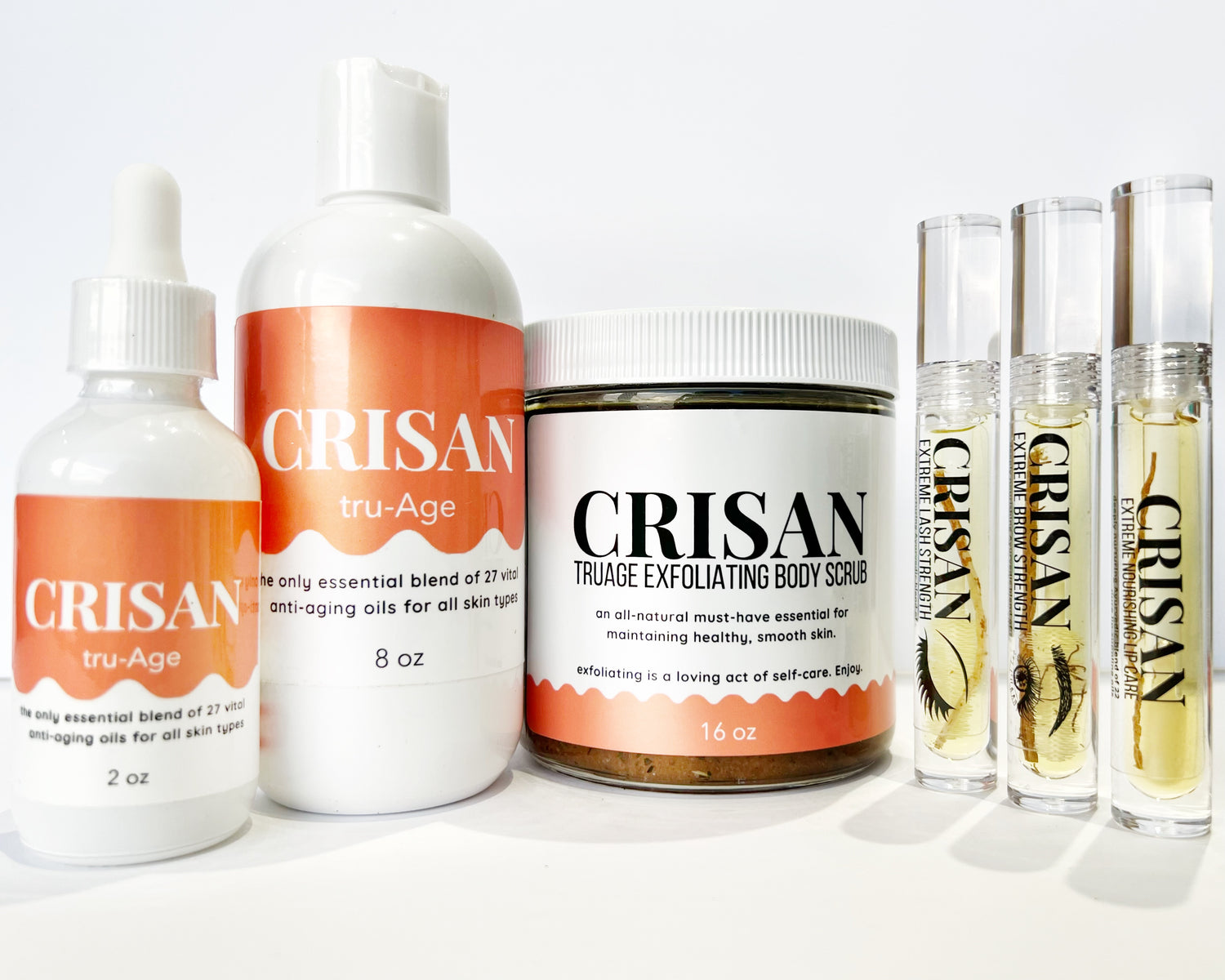
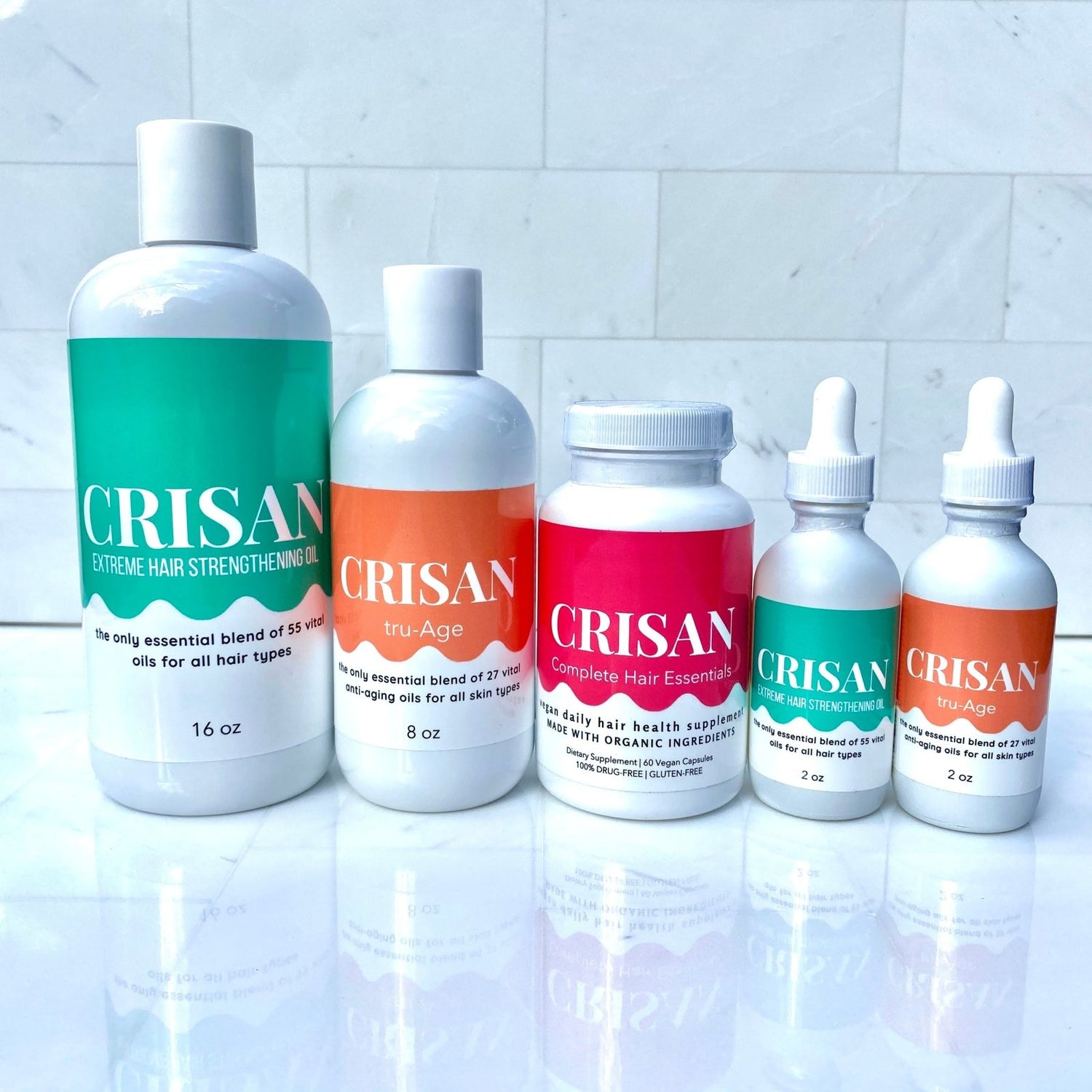












2 comments
I am interested in your hair health vitamins but when I tried to order from Canada – it took it off my order – as cannot ship to me.
H e l p!
Great article on hair vitamins and support. Thanks so much. I have experienced excessive hair fall recently. I am using the follicle support and will start the hair vitamins back again. I am retaining length on most of my hair (Crisan Hair Strengthening Oil). But just need to hang in there consistently to get the results I want and was experiencing from previous usage. God bless, TW